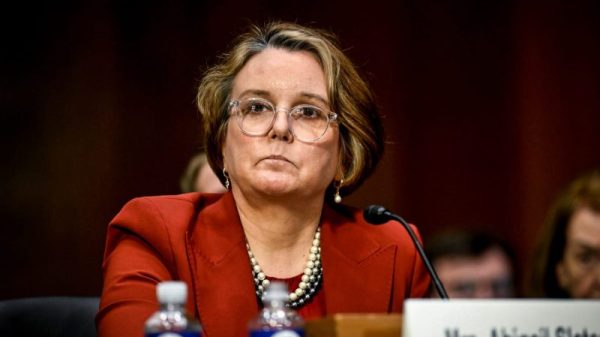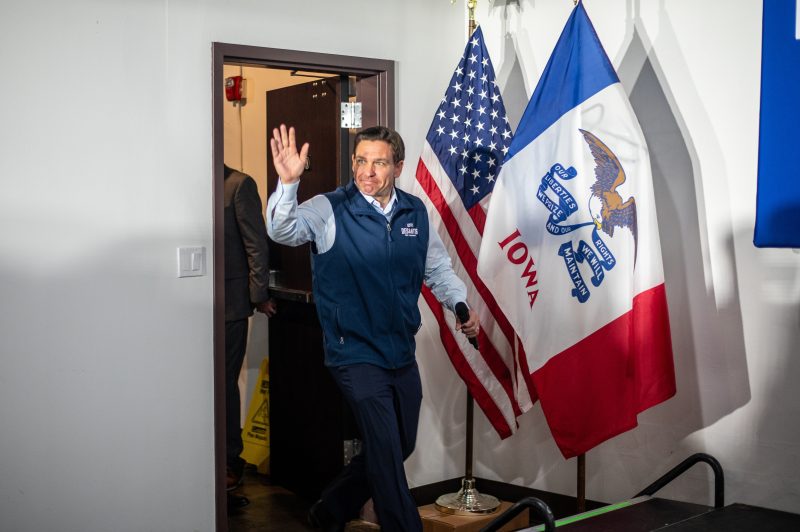TALLAHASSEE — When Joe Gruters arrived at Donald Trump’s presidential campaign kickoff at Mar-a-Lago last November, Florida’s then-GOP chairman startled even some of Trump’s top aides.
“You’re the bravest man in Florida for being here,” Susie Wiles, Trump’s top aide, told Gruters at the November event.
Gruters — who served as chairman of Florida’s GOP for four years under Gov. Ron DeSantis and was then leading Florida’s party — said backing Trump wasn’t a difficult decision. DeSantis had backed Gruters for party chair but treated him poorly while he was chairman, speaking to him “infrequently” and rarely inviting him to meetings or events, he said. The governor tried to purge his staff, Gruters said. DeSantis didn’t trust many people, Gruters said, and would not even let ostensible allies like Gruters inside his orbit.
Gruters said in recent interviews that he knew DeSantis was going to have difficulty in the presidential race because of his previous experiences with the governor.
“The more he is met by people, the more they are not going to like him,” said Gruters, who is also a state senator. “The more he’s out there, the more his numbers go down. It’s not a good long-term scenario for him. I fully expected the downfall of his campaign a long time ago.”
DeSantis’s struggles to get off the ground have surprised many leaders inside the Republican Party, who hoped he would be a strong contender and would translate his governance of Florida into a center-right coalition that could capture the presidency. After his landslide victory in the 2022 gubernatorial election, he was viewed as a nascent kingmaker in the party with the best chance to help the party turn the page on Trump.
Since then, his poll numbers have slid, some donors and supporters have raised questions about his campaign, he has faced financial struggles and he has been forced to lay off dozens of staffers and recently replaced his campaign manager. Awkward encounters have sometimes dominated his campaign trips.
Interviews with more than 30 people in Florida and Washington, D.C., who worked closely with DeSantis — many of whom spoke on the condition of anonymity to describe their interactions with him — indicate that expectations were lower among some who knew him closely in Tallahassee than among national observers — and that they always expected the candidate to be the challenge.
Republican supporters of DeSantis point to his accomplishments as governor and say that he has shown more adroitness on the campaign trail in recent weeks than he had before, particularly in small-scale events in Iowa. They also note Florida’s booming population under his governorship, what they view as courage during the coronavirus lockdown, the state’s low tax rate and his remaking of the Florida Supreme Court into a supermajority.
“Governor DeSantis has the support of over 100 state officials in Florida because he has worked with them to implement an unmatched conservative agenda that has led to safer streets, better schools, and made the Sunshine State an economic powerhouse — he will do the same for the nation as president. The governor has also remade the political map in Florida, assisting candidates from Congress to the school board as he has turned Florida from purple to red,” Andrew Romeo, a DeSantis spokesman, said.
Paul Renner, the speaker of Florida’s House of Representatives, said he endorsed DeSantis partially because he believed that DeSantis could win the presidency — and Trump could not. He cited DeSantis’s championing a strict abortion law and a constitutional carry gun measure, while also pushing schools to reopen during the pandemic and raising the salaries of teachers, as among the reasons he endorsed DeSantis.
“He’s delivered like no other governor has on both policy and elections. I’m less concerned about having my ego stroked,” Renner said.
He added: “You can’t look at him and his leadership on covid, his leadership through hurricanes and his record-setting election and say he’s not someone who doesn’t connect with people and is not a leader.”
Some of his sharpest critics agree that he has been ruthlessly effective at times and has run a mostly disciplined governor’s office. Allies say there is still time to run a successful campaign — he picked up the endorsement of influential Iowa radio host Steve Deace on Friday — and note that he remains in second place and that Trump could falter under multiple indictments.
“We’re in August, and Iowa isn’t for another six months,” said state Sen. Blaise Ingoglia, a top DeSantis ally. “There’s a lot of time between now and when the Iowa caucuses happen, and you don’t want to peak too soon. You want to do things methodically, constantly get your messages out, and I think the campaign is on the path to do that.”
Still, in interviews, Florida Republicans described an aloof governor who believed in “sticks and no carrots,” according to a senior Florida official, and whose idea of negotiating was “my way or the highway,” in the words of another. An insular governor who infrequently talked to some senior members in his own Cabinet, including his top law enforcement officials, or other leading Republicans. A congressman who seemed to avoid any opportunity to make friends with others in the delegation. A politician who rarely tried to connect with donors and supporters and seemed to not enjoy being around crowds or attending events. A governor who sometimes declined to participate in a lot of the customary niceties in politics, such as thank you notes and calls to donors.
“It’s kind of what I expected to see,” Rep. Byron Donalds (R-Fla.), whose backing of Trump stung DeSantis according to people close to the governor, said of the DeSantis campaign. He added: “In presidential politics, you have to be able to engage and connect with people. It’s through TV, it’s through interviews, it’s charisma. You know it when you see it … I never felt like it was something the governor would be able to do or accomplish.”
Most members of the Florida congressional delegation have endorsed Trump — and many traveled with him on Saturday to the Iowa State Fair. Trump’s team paid to fly a banner over DeSantis with the message “Be Likable, Ron!” At a dinner at Trump’s Mar-a-Lago Club in Palm Beach, Fla., earlier this year, members discussed in scathing terms how he had treated them, people familiar with the dinner said.
Rep. Greg Steube (R-Fla.), once a prominent DeSantis backer, said at the dinner that when he suffered a serious injury, DeSantis never called to check on him, but Trump did. He then decided to back Trump.
“In terms of building relationships with other members, it wasn’t his strong suit. He just doesn’t do that,” Donalds said.
Florida Lt. Gov. Jeannette Núñez, who supports DeSantis for president, said there were other factors at play with Trump’s congressional endorsements. Donalds, she said, “had a relationship with the governor and he chose to go in an opposite direction.” She noted that DeSantis had more than 100 endorsements from state lawmakers.
“They were scared Trump would primary them,” she said. “There are plenty of members of Congress who endorsed Donald Trump for expediency.”
Several people supporting DeSantis publicly told The Washington Post in interviews that they had to be supportive because of Florida business interests but had little affection for him.
“People in Florida, even his public supporters, are not feeling exactly sorry for him,” said one person who has been publicly listed as a prominent supporter. “There’s a sense of, it couldn’t happen to a nicer guy.”
When his predecessor, Sen. Rick Scott (R), would call or text DeSantis about events in the state, such as hurricanes, his calls were not returned, according to people close to Scott. DeSantis and Scott have not spoken in years other than brief interactions at official events, the people said.
In Florida politics, one incident is repeatedly discussed — and was confirmed by people with direct knowledge of the matter to The Post. At a Florida airport with former representative Gwen Graham, a gubernatorial candidate in the 2018 election cycle, Graham came up and spoke to DeSantis. He stared ahead, leaving his earphones in, and acted like he did not recognize her, according to three people familiar with the incident. Graham later told people it was one of the most bizarre moments of her political career.
When DeSantis has visited parts of the state, he has sometimes not invited the Republican leaders of the local areas, typically a courtesy extended by governors, said Francis Suarez (R), the mayor of Miami and a recent president of the U.S. Conference of Mayors.
“He did multiple events in the city of Miami where we were not given an invitation,” said Suarez, who is running for president. “There was a period of time where we were not invited to things, and this was not uncommon for mayors of Florida.”
Núñez, the lieutenant governor, said DeSantis and the governor’s office always sought to invite legislators from districts where they were visiting to events, and she said the governor had met with Suarez and invited him to events as well. She described Suarez as a wannabe rival of DeSantis.
“He has been included in things,” she said. “It doesn’t mean we have to include him at every time. It doesn’t mean he has to be at every single one of our events.”
Suarez — who launched his long-shot bid for the presidency in June — said that many of his colleagues often felt like DeSantis wasn’t interested in hearing from them.
“With him, he’s a bit of a monologuer,” Suarez said. “It’s not really a conversation. It’s him telling you what’s happening. There’s no opportunity to talk back to him.”
While the Florida legislature passed much of the governor’s agenda, the governor sometimes frustrated lawmakers who believed he was more interested in his own ambitions than governing, according to multiple Republicans who work in the statehouse.
The state’s two top Republican lawmakers came to appear with DeSantis when he signed the budget in 2022. The men, Wilton Simpson and Chris Sprowls, had helped DeSantis secure his agenda. But according to people close to Simpson and Sprowls, DeSantis vetoed some of their biggest priorities with little warning that year — leaving them in the undesirable position of standing and clapping behind him as he signed the state’s budget.
Sprowls and Simpson did not respond to requests for comment for this story.
In another episode, according to people familiar with the matter, the two legislative leaders put together an extensive initiative on flooding and resiliency. When the bill was signed, DeSantis suggested he instructed the lawmakers to do it — which was not true, the people said. “He was always taking credit for ideas that weren’t his,” one person with knowledge of the dynamics said.
When lawmakers proposed their own congressional redistricting plans, DeSantis sent word through his office that they would either back his plan or he would publicly flay them, according to people familiar with the discussions. Eventually, they reluctantly agreed to go along with the governor’s plan.
“It was always, go along with us or else,” a state official said of DeSantis’s office.
Ingoglia said that was an unfair criticism. Ingoglia said lawmakers would often seek meetings with DeSantis through him, and the governor had an “open door policy.” Renner described his relationship with DeSantis as “highly collaborative.”
Ingoglia said DeSantis often made decisions on “gut,” which left lawmakers unhappy. “I wouldn’t put any credence in the spin that the governor is aloof and not approachable,” Ingoglia said.
“He values the partnership he’s had with the legislature,” Núñez said.
Former senior officials in the state government said he largely avoided conversations with them, instead sending diktats through his chief of staff or senior advisers. Two former government officials familiar with his security detail said he often did not speak to members or know their names — and would leave food wrappers and other items in the back of the state car. A photo reviewed by The Post confirmed that.
Successful executives, some of his defenders say, often govern with brute force. And some lawmakers say other Florida governors exhibited similar traits. “Every governor has a giant ego,” said state Sen. Ed Hooper (R), one of the few who did not endorse DeSantis. “I’m not sure he’s that different.”
Earlier this year, many state lawmakers said they felt pressure after DeSantis and his team demanded presidential endorsements before he officially entered the race and before the state budget was signed. The governor has strong powers in influencing the state budget and can veto individual items without recourse in Florida.
DeSantis ultimately secured about 100 endorsements from Republicans in the state legislature — an impressive feat before even entering the race. A DeSantis campaign official said dozens of Florida legislators are meeting in Tampa next week for a fundraising telethon to boost DeSantis.
But some Republicans in the state said the lobbying left them unnerved.
Gruters and two other lawmakers — who spoke on the condition of anonymity so as not to alienate the governor — said many Republicans felt they had to endorse DeSantis or else. The former state party chairman said at least five lawmakers told him they feared they would lose projects in their district if they did not, as endorsement calls were being made by at least one prominent DeSantis governmental aide.
“It wasn’t a tit-for-tat, but in conversations about endorsements, they were mentioning projects that people wanted in the budget. There’s no question there is a general fear of projects being vetoed,” Gruters said.
Hooper said some of his colleagues endorsed out of fear.
“There were several House members who were worried a primary House candidate would pop up against them,” he said. “Maybe they were worried about budget items and a candidate opposing them.
Núñez said the governor supported “many” projects that were not backed by members who endorsed him — and that he wielded the veto pen often because he carefully scrutinized projects. “He doesn’t look at it through that prism,” she said. She added: “Joe [Gruters] is on the opposite side. That’s fine. I think it is not necessarily rooted in reality.”
Ingoglia said he talked with about 40 lawmakers about endorsing DeSantis and that most were happy to do so immediately. Ingoglia said the notion that there was untoward pressure put on lawmakers to endorse was “ridiculous.” Renner said his endorsement of DeSantis was “organic.”
Since endorsing Trump, Gruters said he had not spoken to DeSantis’s team in months. Many of his projects were vetoed this year, far more than other lawmakers, Gruters said.
“In the past, you’d get a call saying what was going to be vetoed and why,” Gruters said. “This year, I haven’t heard a word.”
Beth Reinhard and Alice Crites contributed to this report.



























